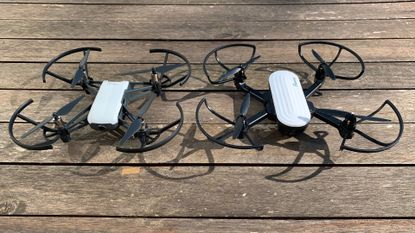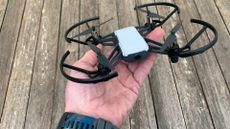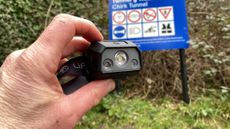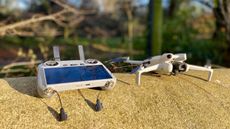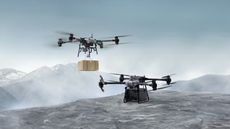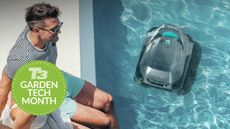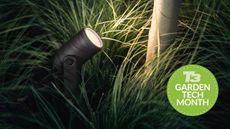In this Ryze Tello vs Potensic Elfin face-off, I'll be comparing two of today's best drones for kids. There are two of the most popular toy drones currently on the market, but they each offer something slightly different.
Launched in 2018, with its ability for precision flight, software smoothed video and a host of useful and playful extra abilities, the Ryze Tello quickly established itself as the best toy drone around. Two years later, Potensic launched the Elfin. With a very similar appearance and price-point, this new model looked to directly challenge the Tello.
While there are plenty of camera-equipped toy drones available these days, the Tello and the Elfin stand out in the market. But does the newer Elfin have what it takes to seize the Tello’s best cheap drone crown? You can find out everything you need to know about each drone by reading our Ryze Tello drone review and Potensic Elfin drone review; otherwise keep reading to find out how they compare.
Before we get any further, a quick bit of housekeeping. The current UK drone regulations mean that in order to fly any camera-equipped drone outdoors, you’ll first need to obtain an Operator ID. Head to the CAA website to find out more and purchase an ID. Or if you're reading this from the States, check the US drone rules and regulations.
- The best drone for flying, filming and photography
- Need something even more basic? Check out the best drones for kids
- What makes the best drone for beginners?
Ryze Tello vs Potensic Elfin drones: design and features
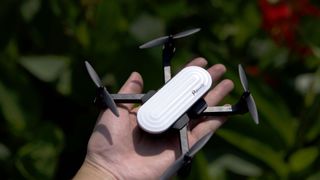
Weighing less than 250g, both drones fall into the ‘toy drone’ category, but the Tello (80g) is slightly lighter than the Elfin (95g) – both weights are with a battery fitted. The two models are a very similar size too, though the Elfin is a slightly bigger at 200L x 190W x 40D as opposed to the Tello’s 180L x 170W x 40D (mm). However, foldable propeller arms enable the Elfin to pack down to a smaller size.
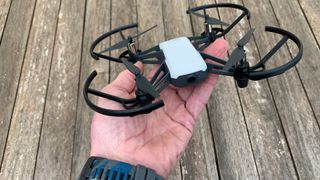
Both drones are constructed with robust plastic bodies and in testing have proven capable of taking some hefty knocks without any serious damage. As on the vast majority of drones, the cameras on the Tello and Elfin are positioned on their noses. However, while you can manually adjust the vertical position of the Elfin’s camera, the Tello’s is fixed in place.
The only major significant difference between the two is that while the Elfin comes complete with a controller and storage case, you get neither with the Tello. A controller for the drone is available and costs around £40.
Winner: Potensic Elfin
Ryze Tello vs Potensic Elfin drones: flight and stability
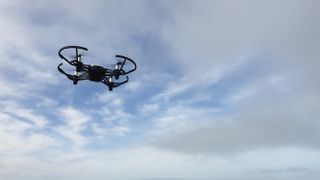
Using a combination of a tiny underside camera and an infrared sensor, the Tello does a brilliant job of maintaining a steady hover indoors or in zero wind. The Elfin also uses a miniature camera to hold a steady position when airborne, but while better than most price-rivals, it’s not as effective as the Tello’s tech.
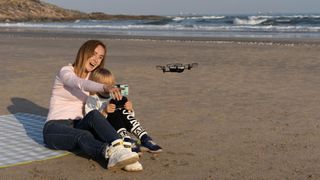
Similarly, while moving indoors, it’s easy to for Tello pilots to make really precise movements while the Elfin is a touch harder to control. Take either drone outside though and in even the lightest winds, both drones struggle to respond to control inputs and you run the risk of any sudden gust carrying them far into the distance.
Winner: Ryze Tello
Ryze Tello vs Potensic Elfin drones: video and stills

A still taken on the Ryze Tello
While both the Tello and the Elfin have the same video resolution of 720P, the Tello gives far better results. The Tello uses in-built software to stabilise its video footage which gives impressively smooth footage. Lacking such a facility, the Elfin’s footage is affected by every tiny movement of the aircraft and looks very shaky in comparison.
Despite having the same (relatively low) video resolution, once again the Tello comes out on top. The Elfin’s footage is far grainer and less vibrant than the Tello’s – which we assume is due to the Tello having a better image sensor.
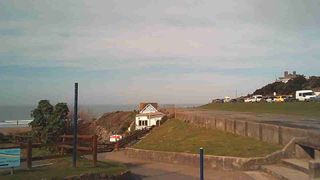
Still photo shot using the Potensic Elfin drone
Stills-wise, both aircraft have improved resolutions, with the Tello able to take 5K images and the Elfin 2K shots. Like its video, a lack of clarity and colour depth detracts from the Elfin’s stills, though don’t expect great results from either drone.
Winner: Ryze Tello
RYZE TELLO VS POTENSIC ELFIN: APP SUPPORT
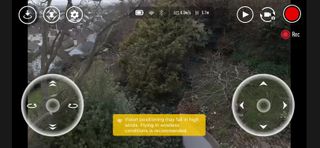
Controller interface for the Ryze Tello
While both aircraft can be flown via their respective apps, it’s a lot easier to use a dedicated controller. The Tello app is the best we’ve seen for this level of drone, despite having to flip to a secondary window to access every flight facility. The Elfin’s app works is easy to use and works very well, but it’s not quite as slick as the Tello’s.
Both apps enable you to record video and stills to your device and also give you access to a range of additional in-flight functions. The Tello can perform a range of pre-set manoeuvres such as flips and circles, while you can plot a course on your touchscreen for the Elfin to follow and control the drone via your phone’s gyroscope.
Winner: Ryze Tello
Ryze Tello vs Potensic Elfin drones: which one should I buy?
The Tello’s RRP is £99 compared to the Elfin’s £89.99, and with a controller and storage case included as standard, the Elfin is definitely better value for money. When comparing the two on performance alone though, while the Elfin is one of the better drones in its class, the Tello beats it in every respect and, amazingly three years after launch, is still the top toy drone around.
